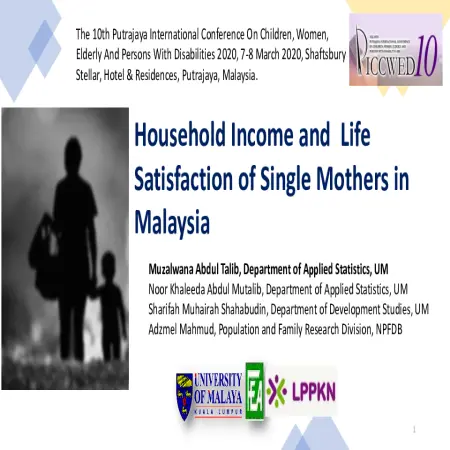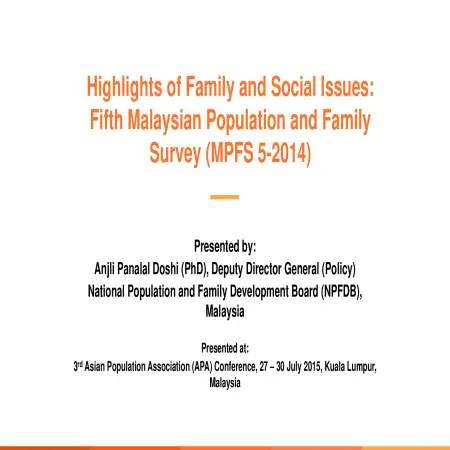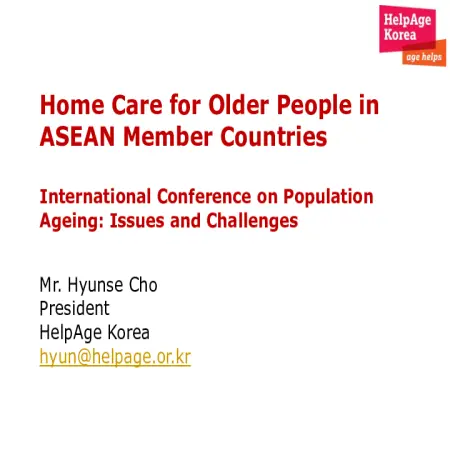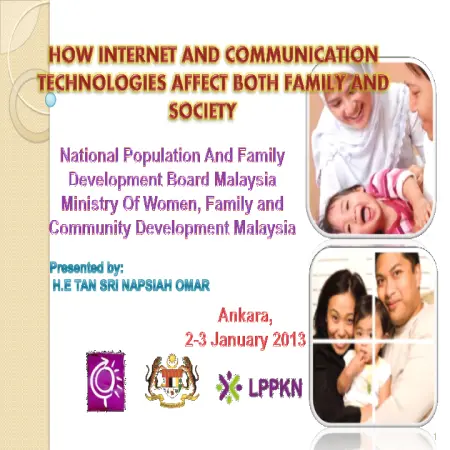Browse by Type
Results for Item type : "Conference or Workshop Item"
2020 (1)
|
|
Household income and life satisfaction of single mothers in Malaysia
Item Type: Conference or Workshop Item
Editor:
Year: 00/03/2020
Abstract: This study attempts to explore the socio –demographic and economic background of single mothers in Malaysia and to examine their income category and level of poverty. This study utilizes the Fifth Malaysian Population Survey (MPFS5) data. However, for this study, the target respondents are working single mothers (either widowed, divorced, separated); aged 15- 59 years old; residing in Peninsular Malaysia and have children staying together with them. Findings from this study reveal that household income of single mothers falls under the B40 category but there is not enough evidence to claim that their household income is below the poverty line. Chi – Square test of associations prove relationships between poverty level to socio – demographic variables such as level of education and residential states, while PLS – SEM techniques show that income category of single mothers is somehow related to the predictors of life satisfaction construct and the overall life satisfaction. Single mothers are already facing limited job market and reduced salary with their low level of educational attainment. Therefore, some suggested policy recommendations are to protect and promote single mothers involved in elementary occupations and to create more quality jobs to develop these women from the existing low-paid of the informal into the formal sectors.
|
|
|
|
2015 (1)
|
|
Highlights of family and social issues : Fifth Malaysian Population and Family Survey (MPFS 5-2014)
Item Type: Conference or Workshop Item
Editor:
Year: 00/00/2015
Abstract: This slide Highlights of Family and Social Issues from finding of the Fifth Malaysian Population and Family Survey (MPFS 5-2014).
|
|
|
|
2012 (2)
|
|
Home care for older people in ASEAN member countries
Item Type: Conference or Workshop Item
Editor:
Year: 00/00/2012
Abstract: It is estimated that population of over 60 years in the South-Asia will triple between 2000 and 2050. By 2050, one out of four older people will be over the age of 80. This causes a growing need for welfare and health services for older people. However, the traditional family support system is under pressure due to the trend towards nuclear families, prevailing migration of children and increasing participation of women in the workforce. In most developing countries, the lack of appropriate programmes, policies and financing places further strain on an already stressed family system. In order to meet the growing needs of “CARE” services for older people in the community, HelpAge Korea have implemented HOME CARE project under the ROK-ASEAN Cooperation Project, which provides basic social and health related care services for older people who are poor and having difficulties of ADL at their home by volunteers. The HOME CARE project has been implemented in collaboration with government, non-government organizations and community people in 10 ASEAN member countries for 9 years from April 2003 to May 2012. The presentation shares the outcomes of HOME CARE project that has been successfully conducted in terms of developing localized model, strengthening GO & NGO collaboration for the expansion and influencing GO to integrate HOME CARE into policy framework. HOME CARE is one of community based care system to reduce the burden of the society and to improve the quality of life of older people. However, in responding to the need of vulnerable older people, there is no single solution but a series of care system is necessary. The presentation shares the future plan of ROK-ASEAN Cooperation Project on COMMUNITY BASED SERVICES of HelpAge Korea.
|
|
|
|
|
|
How internet and communication technologies affect both family and society
Item Type: Conference or Workshop Item
Editor:
Year: 00/00/2012
Abstract: This slide presentation shares about 65.1% Malaysians using the internet more than 9 hours. The population of internet users is 17.5 million out of a total of 28.6 million. Broadband penetration is 65% of the population in 2012. The positive impact on family is to enhance communication, strengthens relationships, enable parents to work from home and monitoring of children. Meanwhile, the negative impact on family are such as internet addiction, weakening family relationship, “narcissistic” behavior, excessive self-admiration especially among teens. Playing on the computer in the long term can lead to addiction, ill tempered nature and becoming antisocial. Children also can become more aggressive due to expose to violent games.
|
|
|
|








